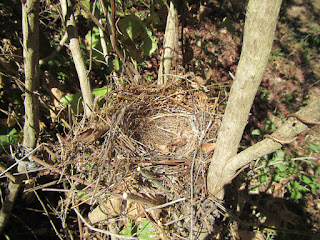 |
| The shy little Bewick's Wren |
Sitting on a cushion, four feet from a tangle of toyon and coyote bush, I hear an eruption of urgent chattering within the thicket, and a buzzing in another bush a few feet to its right. I recognize the sounds of the Bewick’s wren, one of my favorite small birds. Bzzz. Bzzzz. Bzzzzz. Bzz bzz bzzz.
Continuously the noises endure. The birds are distressed. It’s distressing. My heart sits heavy like a lump of clay stuffed with stones. What can I do? I have no idea what I would be interfering with.
The Thich Nhat Hanh meditation I had begun is fluttering like rags at the edge of my mind.
Breathing in, I calm myself. Breathing out, I feel at ease. Breathing in, I smile. Breathing out, I release. Breathing in I dwell in the present moment. Breathing out, I feel it is a wonderful moment.
It is not a wonderful moment. A Western Scrub Jay takes off from the behind the bush. He or she flies in confident upward swoops to the top of a Monterey pine a couple hundred feet away.
 |
| Western Scrub Jay at our bird bath |
My heart twists. I find I am holding my breath. There is a little noise from the wrens, then silence.
I note that the jay does not clean its beak on the branch of the pine, which may be a good sign. Good that is, if you are on the side of the wrens.
I feel like I’m sitting before Schrodinger’s nest. I want to believe that the little mother stuck to her nest and poked at that big bad jay till he gave up. But I can’t. And I can’t think of the jay’s nestlings either.
 |
| An empty nest, somewhere else in the garden. |
Whatever actually happened in a sense doesn’t matter. Life eats life. It’s going on all around me, and within me too. I’m having Tennyson’s emotional crisis, without his particular disturbance of faith. Nature is indeed, among other things, red in tooth and claw.
We who garden for wildlife, and encourage others to do so, tend to emphasize easier things...
 |
| The hummingbirds, who are flashing their beautiful colors and twittering all around me |
 |
| I still keep up my dad's practice of feeding hummingbirds |
 |
| The sparrows and finches I’ve watched feasting on the bunch grass seeds |
 |
| Butterflies nectaring on the coyote mint |
 |
| House finches eating elderberries |
 |
| Lizards catching flies -- Well, insects are harder (though not impossible) to empathize with. |
Near the Bewick Wren’s nest (or where I anyway surmise there is a Bewick Wren's nest) I hear a little buzzing to the left now. Then, a little later, buzzing to the right. Do I hear a brief fluttering within the bush?
Who am I kidding. If that jay wasn’t successful this time, she’ll be back. I wonder how long birds feel distress? I wonder what child-free birds do with the rest of their summer? Do they breed again? Do they rest and grow plump?
I’m not sure what to do with this wrenching empathy. I feel the need to end this post on an uplift. I know it’s a kind of inappropriate tenderness that makes me close my eyes during certain parts of any David Attenborough documentary. He is as boyishly enthusiastic about hyenas taking down baby gazelles as he is about the amazing colonies of bats whose guano he sinks knee-deep into as he approaches their cave. I adore him, I do, with a love that goes back fifty years or more. I just can’t be him.
Thich Nhat Hanh would meditate to the source of his anger or upset and look for the loving or forgiving action to take. But here no wrong has been done. What action is needed? This is just what it is to be alive. We suffer. We rejoice. We feel. We eat.
 |
| Feast of food for humans, made from mostly native plants (and animals) at one of Alrie Middlebrook's Eating California lunches. |
Comments
I try to remember that smart little birds might manage to hide their nests better. I believe the thought is that parents so inexperienced that the jay can easily find the nest might not be able to rear the babies successfully. And if they did, you wouldn't get the smart genes to be going to the babies.
As for the parents, I like to think they'll have a grand time without the bother of feeding the babies.
Thanks for visiting and commenting on the post. Yes, Darwin would say this is all to the survival of the species, but we humans get so involved with the individuals!
shelley AT gardeningknowhow DOT com
Thanks and hope to hear from you soon!